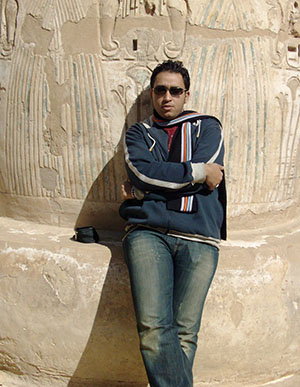Mohamad M. Gendy - ESR9
Nationality: Egyptian
Main Host Institution:
Institute of Biomedicine,
University of Gothenburg
Academic Background:
- Master’s Degree in Biotechnology, Chonnam National University, South Korea (2012-2014).
- Centre Français de Culture et de Coopération (CFCC) Fellowship, University of Nice, France (2011).
- Master’s course-work in Cell Biology and Gentics, Faculty of Science, Alexandria University, Egypt (2010).
- Teaching Assistant of Molecular Genetics, Faculty of Science, Alexandria University, Egypt (2009).
- B.Sc in Science with Honour, Faculty of Science, Alexandria University, Egypt (2004-2008)
Project Title: Identification and characterization of lncRNAs involved in cell-cycle regulation
Project Background: The recent ENCODE consortium has estimated that only 2 to 2.3% of the human genome is encoded for proteins, while more than 75% of the genome is pervasively transcribed into other, most likely, regulatory non-coding RNA (ncRNA) counterparts. Since the interplay between different ncRNAs and different cell cycle regulators has been proposed in many organisms, the interrogation of the intimate functional relationship of ncRNAs to cell cycle progression and tumor hemostasis in different cancer types will be of great importance.
Currently, in our lab, we are optimizing a nascent RNA capture assay coupled with high throughput sequencing that enables high-resolution mapping of ongoing RNA transcriptional events. Using an optimized nascent RNA capture assay, we shall be able to detect newly synthesized RNAs during different stages of cell cycle. In addition, the use of bioinformatics approaches will facilitate the selection of differentially expressed candidate lncRNAs for further downstream analysis; aiming to elucidate their functional role in the cell cycle progression as well as other critical cellular events through siRNA library construction followed by global expression analysis and epigenetic profiling.
Project Aims: We aim to functionally characterize important long non-coding RNAs which are differentially expressed during different time points of S-phase to dynamically regulate critical events involved in DNA replication as well as cell-cycle progression.
The construction of siRNA library can aid to depict the functional correlation between candidate ncRNAs and tumor progression, in respect to their corresponding targeted sites. Briefly, we would like to investigate candidate ncRNAs as potential biomarkers and key regulator in cell cycle progression in different cancer cell lines.
Expected outcomes:
1- Establishing Nascent RNA capture assay that can be used in different cell lines.
2- Characterization of novel lncRNAs involved in cell cycle regulation.
3- Identification of new tumour marker genes.
